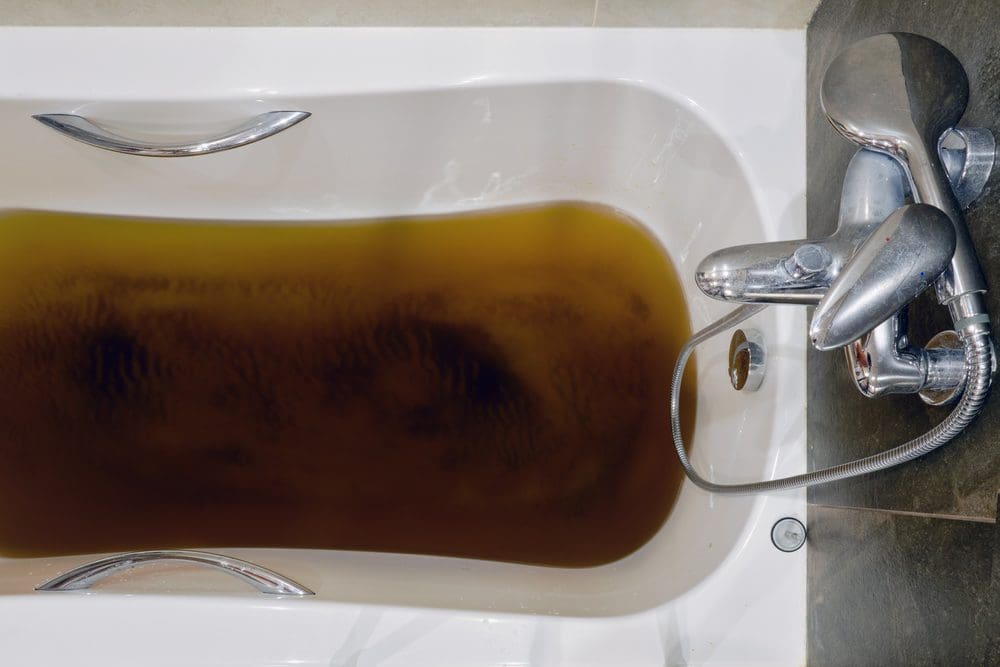Examining Why Sewage Comes Up Through the Bathtub
Examining Why Sewage Comes Up Through the Bathtub
Blog Article
Just how do you feel in regards to Why is There Sewage Coming Up Through the Bathtub?

Sewage backup in the bathtub can be a traumatic and unhygienic trouble for any kind of homeowner. Not just is it bothersome, yet it likewise presents serious health threats and suggests underlying issues with the plumbing system. Comprehending why sewage is turning up via the bathtub is vital for taking proper action to resolve the trouble effectively.
Intro to the Problem
Understanding the Trouble
When sewage draws back up into the tub, it's a clear sign of a trouble with the water drainage system. The wastewater that should be moving far from your home is rather discovering its back into your home, which can bring about considerable damage and health hazards.
Prospective Causes
Numerous variables can contribute to sewage back-up in the tub. From obstructions in the sewer line to concerns with the plumbing facilities, determining the root cause is necessary for finding a service.
Common Reasons for Sewer Back-up
Blockages in the Sewer Line
Among one of the most typical reasons for sewer back-up is a blockage in the drain line. This can happen because of the build-up of debris, grease, or international things in the pipelines, preventing correct circulation and creating sewage to back up right into your tub.
Tree Origin Intrusion
Tree origins seeking wetness and nutrients can infiltrate drain lines via tiny fractures or joints. With time, these roots can expand and broaden, creating significant damages to the pipes and bring about sewage back-up issues.
Aging Facilities
Older homes might have obsoleted plumbing systems that are more vulnerable to deterioration, splits, and deterioration. As pipes age, they come to be much more vulnerable to leakages and clogs, increasing the likelihood of sewer backup events.
Heavy Rainfall or Flooding
During periods of heavy rainfall or flooding, the sewer system might become overloaded with excess water, causing backups and overflows. This can lead to sewage backing up right into tubs and various other components inside the home.
Health Risks Connected With Sewage Back-up
Contamination of Supply Of Water
Sewer backup can pollute the water system in your home, posturing a major wellness danger to you and your family members. Direct exposure to polluted water can bring about intestinal concerns, skin infections, and various other ailments.
Spread of Illness
Sewer includes harmful microorganisms, infections, and parasites that can cause a series of conditions, including liver disease, cholera, and gastroenteritis. Coming into contact with sewer or contaminated surfaces places you in jeopardy of infection.
Mold and mildew Development
Wetness from sewer backup can create optimal conditions for mold development in your house. Mold spores can intensify respiratory troubles and trigger allergies in delicate individuals, making punctual cleanup crucial.
Indications of Sewer Backup
Foul Odors
Unpleasant odors rising from drains or components, specifically in the washroom, might show sewer back-up problems. These smells are often strong and consistent, indicating a trouble that calls for immediate attention.
Slow Draining Fixtures
Tubs, sinks, and bathrooms that drain slowly or otherwise at all could be experiencing sewage backup. If multiple components are impacted simultaneously, it's most likely that the problem originates from an usual point, such as the primary sewage system line.
Gurgling Sounds
Odd gurgling or bubbling sounds coming from drains pipes when water is running somewhere else in your home are a sign of air trapped in the plumbing system. This air build-up can result from sewage backup and must be investigated promptly.
Immediate Actions to Take
Shutting Off Water System
In case of sewer back-up, it's important to switch off the water to avoid further contamination and damage. Locate the primary water shutoff valve in your home and shut it off until the concern can be fixed.
Getting In Touch With an Expert Plumber
Managing sewer back-up is not a DIY job. Call a licensed plumber with experience in taking care of sewage-related problems to examine the situation and perform necessary repairs or clean-ups.
Staying Clear Of Contact with Infected Water
Till the sewer backup is dealt with, stay clear of contact with polluted water to avoid the spread of microorganisms and pathogens. Use protective equipment if you have to be in the affected location and clean your hands thoroughly later.
Safety nets
Routine Maintenance of Drain Lines
Arrange routine examinations and upkeep of your drain lines to identify and deal with prospective concerns before they intensify right into significant problems. This can include cleaning particles, checking for tree root breach, and repairing any damaged pipes.
Mounting Bayou Valves
Consider setting up backwater shutoffs in your plumbing system to stop sewage from receding into your home throughout periods of heavy rainfall or flooding. These valves instantly close when water draws back up, protecting your property from contamination.
Appropriate Disposal of Home Waste
Prevent purging anything besides toilet tissue and human waste down the toilet to prevent obstructions and obstructions in the drain line. Dispose of grease, oil, and various other house chemicals correctly to lessen the risk of plumbing issues.
Tidying up After Sewer Backup
Disinfection Procedures
Extensively disinfect and disinfect impacted areas after sewer back-up to remove harmful bacteria and protect against mold growth. Usage ideal cleaning items and protective gear to guarantee safe and efficient cleaning.
Repair of Affected Locations
Repair any type of damages to flooring, walls, or components triggered by sewage backup. Depending on the extent of the damages, you might need to change carpeting, drywall, or other products to restore your home to its pre-loss problem.
Why is There Sewage Coming Up Through the Bathtub
Sewage in your bathtub is a major problem that can make you want to abandon the bathroom for good. You don’t have to. However, it is important to identify the source of the issue and take the necessary steps to resolve it in order to avoid any health risks and property damage. In this article, we will discuss what could be causing sewage to back up through your bathtub so you can take action quickly and effectively.
The Main Reason For Sewage Backup in The Bathtub
All the sinks and toilets in your home connect to different pipes that lead to the main sewer line. The sewer line then connects to the municipal sewer system. This connection works seamlessly on a daily basis, but there can sometimes be a problem with the main sewer line.
The most common cause of sewage backup is a clogged or blocked main sewer line. The main sewer line can be clogged due to the accumulation of debris, tree roots or grease buildup, or other materials. Another possible cause is a collapsed pipe. When this happens, your toilets and sinks won’t be able to drain properly. This is when sewage starts backing up through the bathtub. If the problem has been occurring for some time now, it might be time to consult with a plumber as there may be more severe damage that needs fixing.
How Can You Tell if it’s Coming From Your Sewer Line?
If you’re experiencing a sewage backup in your bathtub, then you can use a few simple methods to determine if it is coming from the main sewer line. First, try to unclog the tub drain with a plunger or an auger and see if that helps. If not, then inspect all of the drains in your house and check if there is any blockage in them. If some of the other drains are not working fine, then it’s likely the problem is with your main sewer line.
Common Signs of a Clogged Main Sewer Line
If you suspect that your main sewer line is blocked, then there are a few common signs to look out for. Frequent clogs in your home are a sure sign of a clogged sewer line. You can also check for slow drainage from all the plumbing fixtures.
Slow Drains
If you notice that it takes longer for your sinks and toilets to drain, then this could be a sign of a clogged main sewer line.
Frequent Clogs
Another common sign is that your drains or toilets become clogged almost all of the time. If this happens, then it could be a sign that the main sewer line is blocked.
Water Backup
Do you notice water or sewage coming back up from any of the drains in your home? If your answer is yes, you may have a clogged main sewer line.
Sinkholes
If you’ve noticed sinkholes in your yard or overflowing sewage from the ground, you may be facing a blocked sewer line issue.
Your Shower or Sink Makes Gurgling Noises
Have you noticed gurgling noises coming from your sink or shower lately? These are typically signs of a blocked sewer line and should be checked out immediately.
How to Prevent a Main Sewer Line Clog
Once you’ve identified that your main sewer line is clogged, it’s important to take steps to prevent it from happening again. The best way to do this is to avoid putting any solid material that can clog the drain, such as grease and other debris. You should also be mindful of what you flush down your toilet. In addition, you should schedule regular maintenance for your main sewer line. This will help keep it clear and free from clogs or backups.
What Should You do if You Notice Sewage Backing up Through The Bathtub?
If you’ve noticed sewage backing up through the bathtub, then it is important to call a professional plumber immediately. A plumber can inspect the situation and determine what the cause is, such as a blocked main sewer line. They will also be able to advise you on how best to fix the issue. In some cases, a simple drain cleaning may be all that is needed.
However, if the blockage is severe, then your plumber may need to use more advanced methods to clear the blockage.
No matter what, it is important to always call a professional plumber if you experience any kind of sewage backup. They will be able to assess the situation and provide you with a solution that is best for your home.
https://baylorinc.com/blog/why-is-there-sewage-coming-up-through-the-bathtub/

As a person who reads about Water Coming up Bathtub Drain, I was thinking sharing that piece of writing was important. Enjoyed reading our write-up? Please share it. Help others check it out. Many thanks for going through it.
This Page
Report this page